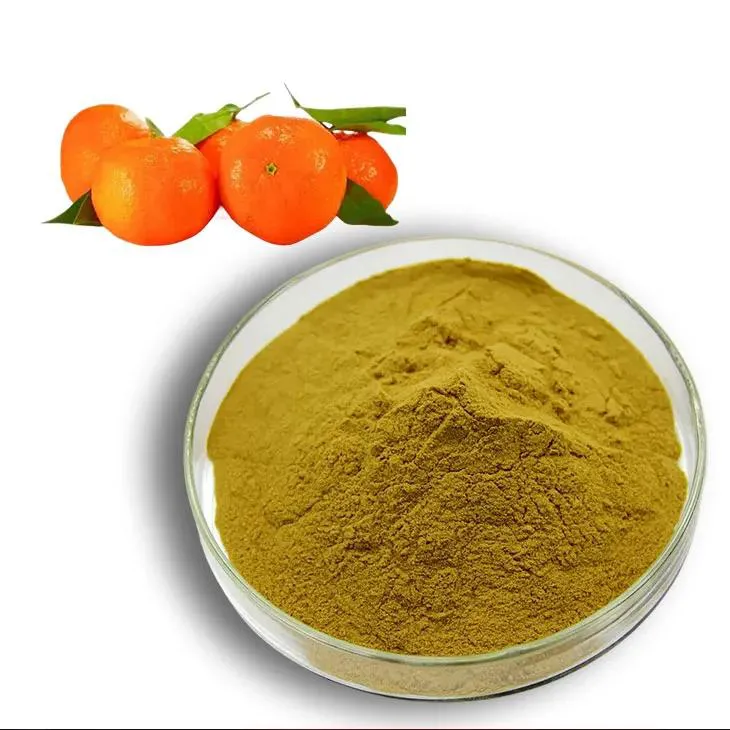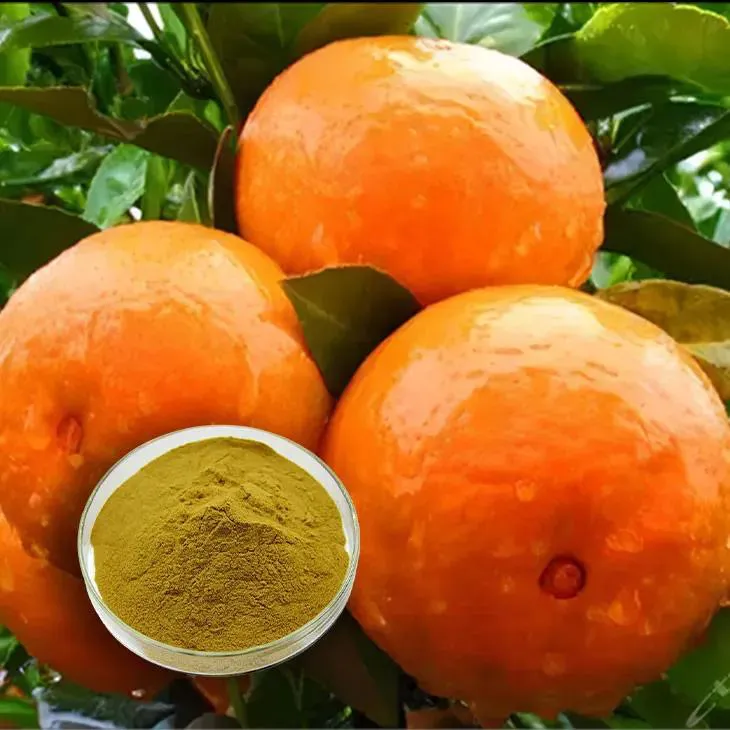- 0086-571-85302990
- sales@greenskybio.com
10 Amazing Health Benefits of Citrus Bioflavonoids.
2024-11-13

1. Introduction to Citrus bioflavonoids
Citrus bioflavonoids are a group of plant - based compounds that are found abundantly in citrus fruits such as oranges, lemons, grapefruits, and limes. These bioactive substances are known for their antioxidant, anti - inflammatory, and antimicrobial properties. They work in synergy with other nutrients present in citrus fruits, such as vitamin C, to provide a wide range of health benefits. In recent years, there has been growing interest in the potential of Citrus bioflavonoids to improve human health, and research has been uncovering some truly remarkable effects.

2. Benefit 1: Powerful Antioxidant Activity
Citrus bioflavonoids are potent antioxidants. Antioxidants play a crucial role in the body by neutralizing free radicals. Free radicals are unstable molecules that are produced during normal metabolic processes as well as due to environmental factors such as pollution, radiation, and cigarette smoke. If left unchecked, free radicals can cause oxidative stress, which is associated with a variety of health problems including heart disease, cancer, and neurodegenerative diseases.
Bioflavonoids scavenge free radicals and prevent them from causing damage to cells. They do this by donating an electron to the free radical, thereby stabilizing it. Some of the most well - known citrus bioflavonoids, such as Hesperidin and naringenin, have been shown to have antioxidant activity comparable to that of vitamin C. This antioxidant effect helps to protect the body's cells, tissues, and organs from damage, keeping them healthy and functioning properly.

3. Benefit 2: Anti - Inflammatory Effects
Chronic inflammation is at the root of many diseases. Citrus bioflavonoids have anti - inflammatory properties that can help to reduce inflammation in the body. Inflammation is a natural response of the immune system to injury or infection, but when it becomes chronic, it can lead to problems such as arthritis, diabetes, and cardiovascular disease.
Studies have shown that citrus bioflavonoids can inhibit the production of inflammatory cytokines, which are signaling molecules that play a key role in the inflammatory response. For example, Hesperidin has been found to reduce inflammation in animal models of arthritis. By reducing inflammation, citrus bioflavonoids may help to prevent and manage a variety of chronic diseases, improving overall health and quality of life.

4. Benefit 3: Boosting Immune System
A strong immune system is essential for good health. Citrus bioflavonoids can help to boost the immune system in several ways. Firstly, as antioxidants, they protect immune cells from oxidative damage, ensuring that they can function properly. Secondly, they have been shown to stimulate the production of white blood cells, which are the body's main defense against infection.
Some research has also suggested that citrus bioflavonoids may enhance the activity of natural killer cells, a type of white blood cell that is important for fighting off viruses and cancer cells. By supporting the immune system, citrus bioflavonoids can help the body to better resist infections and diseases, keeping you healthy throughout the year.
5. Benefit 4: Promoting Heart Health
Heart disease is one of the leading causes of death worldwide. Citrus bioflavonoids offer several benefits for heart health. They can help to lower blood pressure, which is a major risk factor for heart disease. Bioflavonoids such as Hesperidin have been shown to relax blood vessels, reducing the resistance to blood flow and thereby lowering blood pressure.
They also have a positive effect on cholesterol levels. Citrus bioflavonoids can help to reduce LDL ( "bad" ) cholesterol and increase HDL ( "good" ) cholesterol. This helps to keep the arteries clean and reduces the risk of atherosclerosis, a condition in which the arteries become clogged with plaque. Additionally, their antioxidant and anti - inflammatory properties protect the heart from oxidative stress and inflammation, further reducing the risk of heart disease.
6. Benefit 5: Improving Digestive Health
Good digestive health is crucial for overall well - being. Citrus bioflavonoids can play a role in improving digestive health. They can stimulate the production of digestive enzymes, which are necessary for the proper breakdown and absorption of food. This can help to prevent digestive problems such as indigestion, bloating, and constipation.
Furthermore, citrus bioflavonoids have antimicrobial properties that can help to keep the gut microbiota in balance. The gut microbiota is a complex community of bacteria that lives in the digestive tract and plays an important role in digestion, immunity, and overall health. By inhibiting the growth of harmful bacteria and promoting the growth of beneficial bacteria, citrus bioflavonoids contribute to a healthy gut environment.
7. Benefit 6: Protecting Skin Health
The skin is the body's largest organ and needs proper care. Citrus bioflavonoids offer several benefits for skin health. Their antioxidant properties protect the skin from damage caused by free radicals, such as those from UV radiation and environmental pollutants. This helps to prevent premature aging of the skin, including the formation of wrinkles, fine lines, and age spots.
Citrus bioflavonoids also have anti - inflammatory properties that can be beneficial for skin conditions such as acne, eczema, and psoriasis. They can reduce inflammation in the skin, soothing irritation and promoting healing. Some citrus bioflavonoids, like hesperidin, have been shown to improve skin hydration and elasticity, giving the skin a more youthful and healthy appearance.
8. Benefit 7: Enhancing Cognitive Function
Cognitive function refers to the mental processes involved in learning, memory, and thinking. Citrus bioflavonoids may have a positive impact on cognitive function. Their antioxidant and anti - inflammatory properties can protect the brain from oxidative stress and inflammation, which are associated with neurodegenerative diseases such as Alzheimer's and Parkinson's.
Some studies have also suggested that citrus bioflavonoids can improve blood flow to the brain, providing it with more oxygen and nutrients. This can enhance cognitive performance, including memory, attention, and problem - solving skills. For example, naringenin has been shown to have neuroprotective effects in animal models of neurodegenerative diseases.
9. Benefit 8: Supporting Bone Health
Healthy bones are essential for mobility and overall health. Citrus bioflavonoids can support bone health in several ways. They can increase the absorption of calcium, which is a key nutrient for building and maintaining strong bones. By enhancing calcium absorption, citrus bioflavonoids help to ensure that the body has enough calcium to deposit in the bones.
They also have anti - inflammatory properties that can be beneficial for bone health. Chronic inflammation can disrupt the normal bone remodeling process and lead to bone loss. By reducing inflammation, citrus bioflavonoids may help to prevent osteoporosis and other bone - related diseases, keeping the bones strong and healthy.
10. Benefit 9: Anticancer Potential
Cancer is a complex disease that affects millions of people worldwide. While more research is needed, citrus bioflavonoids have shown some promising anticancer potential. Their antioxidant properties can help to prevent DNA damage, which is a key step in the development of cancer.
Some studies have also found that citrus bioflavonoids can inhibit the growth and spread of cancer cells. For example, hesperidin has been shown to have anticancer effects against certain types of cancer cells in vitro. However, it is important to note that citrus bioflavonoids should not be considered a substitute for conventional cancer treatment, but rather as a potential complementary approach.
11. Benefit 10: Managing Diabetes
Diabetes is a chronic metabolic disorder that requires careful management. Citrus bioflavonoids may play a role in managing diabetes. They can help to improve insulin sensitivity, which is crucial for regulating blood sugar levels. By increasing insulin sensitivity, the body is able to use insulin more effectively to transport glucose from the blood into cells, where it can be used for energy.
Some citrus bioflavonoids, such as naringenin, have also been shown to have hypoglycemic effects, meaning they can lower blood sugar levels. This can be beneficial for people with diabetes, helping them to better control their blood sugar and reduce the risk of complications associated with the disease.
12. Conclusion
Citrus bioflavonoids are truly remarkable compounds with a wide range of health benefits. From promoting heart health and boosting the immune system to protecting skin health and potentially having anticancer properties, these natural substances offer a wealth of opportunities for improving human health. Incorporating citrus fruits into your diet on a regular basis is an easy and delicious way to obtain these beneficial bioflavonoids. However, it is also important to note that while citrus bioflavonoids show great promise, more research is still needed to fully understand their mechanisms of action and to determine the optimal dosages for different health conditions. Overall, citrus bioflavonoids are a valuable addition to a healthy lifestyle.
FAQ:
What are citrus bioflavonoids?
Citrus bioflavonoids are a group of plant - based compounds found in citrus fruits such as oranges, lemons, and grapefruits. They are known for their antioxidant properties and play an important role in maintaining good health.
How do citrus bioflavonoids promote healthy skin?
Citrus bioflavonoids promote healthy skin in several ways. Their antioxidant properties help to protect the skin from damage caused by free radicals, which can lead to premature aging. They also help to improve collagen production, which is essential for maintaining skin elasticity. Additionally, some citrus bioflavonoids have anti - inflammatory properties, which can help to reduce skin redness and irritation.
Can citrus bioflavonoids really aid digestion?
Yes, they can. Citrus bioflavonoids can help to stimulate the production of digestive enzymes, which are necessary for the proper breakdown and absorption of food. They also have anti - inflammatory properties that can help to soothe the digestive tract and reduce symptoms such as bloating and indigestion.
Are there any other benefits of citrus bioflavonoids for the immune system?
Citrus bioflavonoids can strengthen the immune system. They enhance the function of white blood cells, which are the body's first line of defense against infection. Also, their antioxidant properties can help to reduce oxidative stress in the body, which can otherwise weaken the immune system.
How much citrus bioflavonoids should one consume daily?
There is no specific recommended daily intake of citrus bioflavonoids at present. However, consuming a variety of citrus fruits as part of a balanced diet can ensure an adequate intake. It is also important to note that excessive consumption may have potential side effects, so it is best to consult a healthcare professional for personalized advice.
Related literature
- The Role of Citrus Bioflavonoids in Health and Disease"
- "Citrus Bioflavonoids: Sources, Properties and Health Benefits"
- "Bioflavonoids from Citrus Fruits: A Review of Their Antioxidant and Anti - inflammatory Activities"
- ▶ Hesperidin
- ▶ citrus bioflavonoids
- ▶ plant extract
- ▶ lycopene
- ▶ Diosmin
- ▶ Grape seed extract
- ▶ Sea buckthorn Juice Powder
- ▶ Beetroot powder
- ▶ Hops Extract
- ▶ Artichoke Extract
- ▶ Reishi mushroom extract
- ▶ Astaxanthin
- ▶ Green Tea Extract
- ▶ Curcumin Extract
- ▶ Horse Chestnut Extract
- ▶ Other Problems
- ▶ Boswellia Serrata Extract
- ▶ Resveratrol Extract
- ▶ Marigold Extract
- ▶ Grape Leaf Extract
- ▶ blog3
-
Cranberry Plants and Skin - care Products.
2024-11-13
-
Red Vine Extract
2024-11-13
-
Tinospora cordifolia extract
2024-11-13
-
Pueraria Lobata Extract
2024-11-13
-
Dandelion Leaf Extract
2024-11-13
-
Marigold Extract
2024-11-13
-
Dan Shen Root Extract/Salvia Root Extract
2024-11-13
-
Acerola Extract
2024-11-13
-
Nettle Root Extract
2024-11-13
-
Agaricus Blazei Extract
2024-11-13
-
Soy Extract
2024-11-13





















